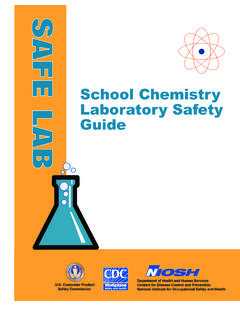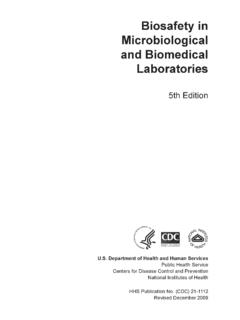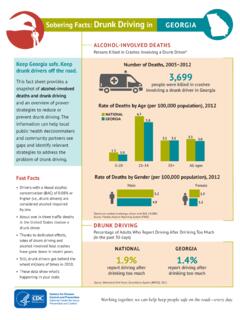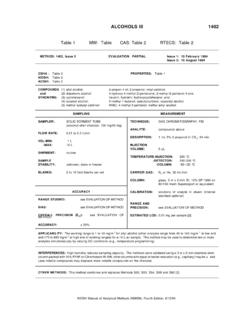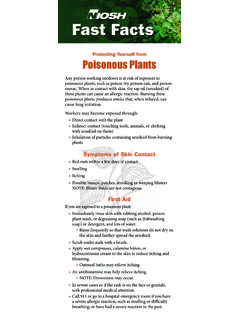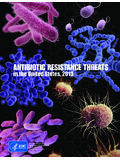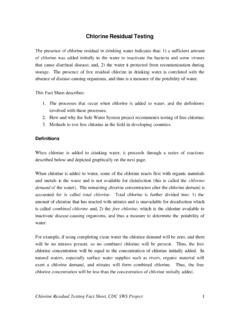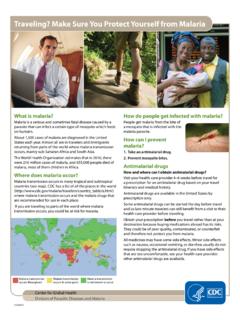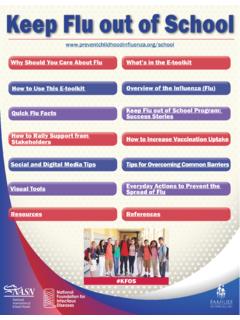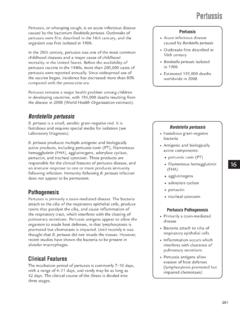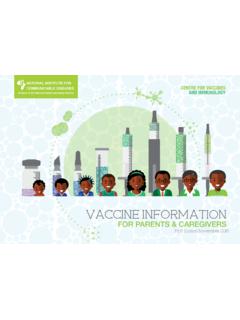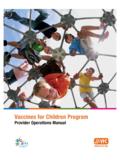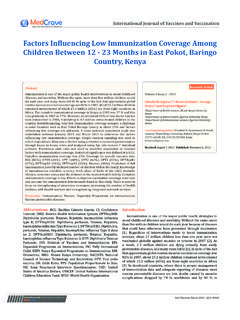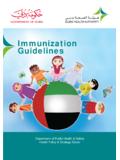Transcription of Vaccine-Preventable Diseases and Childhood Vaccines …
1 Part One Vaccine-Preventable Diseases and Childhood Vaccines Part Three More About Vaccines Parent s Guide to Childhood IMMUNIZATIONS 22 Part Three More About Vaccines Part 3: More About Vaccines How Vaccines Work Immunity from disease When disease germs enter your body, your immune system goes to work. It does three important things: 1. It recognizes the disease germs as not belonging in your body as being foreign invaders. 2. It responds by producing proteins called antibodies, which help destroy these germs. Unfortunately, these antibodies can t act quickly enough to stop you from getting sick. But by eliminat ing the germs, they help you get well. 3. It remembers the germs that made you sick, and if they ever try to infect you again even after many years your immune system will come to your defense again.
2 But now they are able to stop the invading germs before they can make you sick. This is immunity. It is what keeps you from getting sick from Diseases like measles or chickenpox a second time, no matter how often you are exposed to them. In other words, the first time you are exposed to a disease , your immune system won t stop you from getting sick, but it will help you r ecover and make you immune to that disease if you are ever exposed to it again. Immunity from Vaccines With vaccination, killed or weakened disease germs are intentionally introduced into the body, usually by injection. Then your immune system goes to work, just as if you were exposed to a disease : 1. It recognizes the vaccine germs as not belonging in your body as being foreign invaders. 23 Parent s Guide to Childhood IMMUNIZATIONS 2. I t responds by producing antibodies, the same as if you had been exposed to the disease .
3 But there is a difference. The germs in the vaccine are weakened or killed, so they won t make you sick. 3. However, you will still develop immunity, just as if you had gotten sick from the actual disease . So if germs from that disease ever do try to infect you, your immune system will come to your defense and stop them from making you sick. In other words, getting a disease or getting a vaccine can both give you future protection from that disease . The difference is that with the disease you ha ve to get sick to get that protection. With the vaccine you don t. How Safe Are Vaccines ? This is a question that naturally worries any new parent. No matter how good Vaccines are at preventing disease , no matter how much they have reduced Diseases over the years, no matter how many lives they have saved, what if they can actually harm your baby?
4 vaccine safety is a complex issue, and some specific questions will be addressed in Part 4 (Frequently Asked Questions) of this booklet. In the meantime, here are some basics: Can Vaccines harm my child? Any medicine can cause a reaction, even aspirin. Vaccines are no exception. Will Vaccines harm my child? Probably not. Many children never have a reaction to a vaccine . For those who do, most reactions will be minor .. a sore leg, a slight rash, or a mild fever that goes away in a day or two. Some children have more serious reactions like a high fever, chills, fussi ness, or muscle aches. One of the scariest of these reactions is called a febrile seizure. This is a seizure, or convulsion, caused by a high fever. During a febrile seizure a child might shake uncontrollably, become unresponsive, or even lose consciousness.
5 About one child in 25 will 24 Part Three More About Vaccines have at least one febrile seizure, usually between 6 months and 3 years of age. Any high fever, regardless of the cause, can trigger a febrile seizure, including a fever associated with a vaccination. Febrile seizures look serious, but fortunately they almost never are. Children recover with no lasting effects. You can learn more about febrile seizures at gov/disorders/febrile_ Rarely, a child will have a truly serious reaction, like encephalopathy (brain infection) or a severe allergic reaction. These are the scary possi bilities that make some parents think that it might actually be better not to vaccinate their children. Would it? First, serious reactions are extremely rare. One of the most serious a life-threatening allergic reaction to a substance in a vaccine o ccurs only about once in every millio n vaccine doses.
6 There are about a million words in the 7-volume series of Harry Potter books. If we let each of those words represent a dose of vaccine , then one word, somewhere within the 7 books 4,224 pages, would represent the risk of a severe allergic reaction. Second, sometimes it is hard to tell if a reaction was even caused by a vaccine . Any serious reaction th at could be caused by a vaccine could also be caused by something else. There is no such thing as a serious health problem that is caused only by Vaccines . For something that affects only one child in a hundred thousand or a millio n, it can be very har d to isolate the cause. 25 Parent s Guide to Childhood IMMUNIZATIONS Example: Sudden Infant Death Syndrome (SIDS) is the unex-plained, sudden death of an infant, usually while sleeping. The causes of SIDS have always been uncertain, and for a time, some people blamed DTP* vaccine .
7 As evidence, they pointed to the fact that SID S deaths often seemed to occur within several days after a child received a dose of DTP vaccine . But SIDS, by definition, occurs at the same ages when millions of babies were getting multiple doses of DTP so it would have been remarkable i f SIDS didn t occasionally strike right after the shot. Studies were conducted to test this theory, and it was found that babies who had been vaccinated with DTP were no more likely to get SIDS than babies who weren t vaccinated in other words, there was no association. Since then, we ha ve learned that precautions such as putting babies to sleep on their backs and not smoking around them can dramatically reduce the risk of SIDS. (For more information about SIDS, see the American SIDS Institute webpage at ) *DTP is an older version of DTaP.
8 Third, it isn t just risks it s also benefits. True, there is a risk that a dose of vaccine could cause discomfort and other side effects, and a very small risk that it could cause a serious problem. What do you get for taking that small risk? Most importantly, your baby will be protected from more than a dozen potentially serious Diseases . (At this point you might be asking how likely your child is to actually be exposed to one of these Diseases if she isn t vaccinated? For a discussion of this question, see Part 4 [Frequently Asked Questions].) 26 Meet Riley In most ways, Riley is a typical 8-year-old girl. She takes piano and gymnastics lessons, plays soccer, likes to swim, and gets into fights with her brothers. But Riley has something most 8-year olds don t another child s heart.
9 She was born with a serious heart defect and had to get a transplant within days of her birth. Because Riley s new heart doesn t really belong to her, her body would reject it if she didn t take special drugs. These drugs sup-press her immune system, and because of this she can t get live-virus Vaccines like measles, mumps, rubella, or chickenpox. Consequently, Riley is not immune to these Diseases . She has to depend on the im-munity of people around herfor protection. If one of her schoolmates or playmates were to come down with a case of measles or chicken-pox, Riley could easily catch it from them. And because her immune system can t fight off the infection, it could become very serious if not treated promptly. Riley enjoys a normal life today, partly thanks to her friends who are protecting her from infections by get-ting all their shots. Part Three More About Vaccines 27 Riley s self-portrait Parent s Guide to Childhood IMMUNIZATIONS However, the benefits of vaccinating your child also extend to other chil dren.
10 As mentioned earlier, a small percentage of children fail to develop immunity from Vaccines . There are also children who can t get certain Vaccines for medical or other reasons, and babies who are too young to be vaccinated. These children rely on the immunity of people around them to protect them from infectious Diseases . The more children in a commu nity who are vaccinated, the harder it is for a disease to spread. And finally, getting vaccinated today will help protect future generations of children. Smallpox was one of the deadliest Diseases the world has ever known, killing 300 million people in the 20th century alone. But as millions of children and adults got vaccinated over the years, the disease began t o disappear until finally, in October 1977, only one person on Earth had smallpox. When he recovered, smallpox was gone, and it will never kill another baby.
